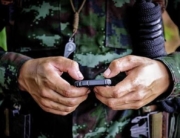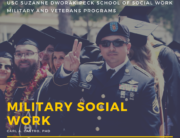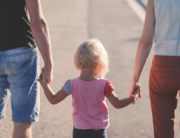Building Capacity initiative tries to boost awareness of military-connected students in public schools
by Linda Jackson
The Building Capacity in Military-Connected Schools project has received a 2014 Pete Taylor Partnership of Excellence Award. The project, a partnership between the USC School of Social Work and eight public school districts in San Diego and Riverside counties, strives to create sustainable models of supportive schools.
Given by the Military Child Education Coalition (MCEC), the award was presented at this year’s National Training Seminar in Washington, D.C. The honor recognizes outstanding teacher preparation programs and celebrates collaboration among higher education institutions, public school districts and military installations.
Accepting the award on behalf of the Building Capacity Consortium were Ron Avi Astor, who has joint appointments at the School of Social Work and the USC Rossier School of Education, and Monica Esqueda, a doctoral candidate at USC Rossier, among other officials.
Making schools more military-friendly
The Building Capacity initiative has sought to increase awareness of military-connected students in public schools while also giving future school social workers, psychologists and counselors practical experience in consortium schools.
The partnership, funded by a grant from the Department of Defense Educational Activity, uses data to better understand the strengths and needs of military students, as well as implementing intervention programs to make schools more supportive and military-friendly.
The partnership award program was created in 2004 to recognize former MCEC Chairman Lt. Gen. (Ret.) Pete Taylor for his work in supporting highly mobile military children.
“MCEC proudly salutes the remarkable difference that these schools and military installations are making in the lives of military children,” said MCEC Executive Director Mary Keller. “By partnering in unique and innovative ways, these military and education leaders follow the example set by Gen. Taylor and remind us once again of the impact that we as a community can have on each military child.”








